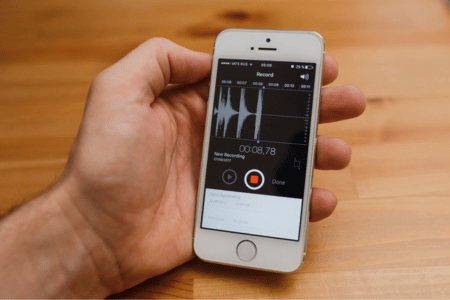
Can an Employer Record Audio at the Workplace in Florida?
You likely spend a significant portion of your day at work, so it is only natural that you form friendships and relationships with your coworkers and supervisors. You communicate with these individuals daily, sometimes on a personal level and with the intention that your conversation be confidential. But can an employer record audio at the workplace in Florida, including your private conversations? For workers in Florida, it is important to understand the legalities of recording audio at work.
Why Employers May Consider Recording Audio at Work
Any employer might consider recording their employees’ conversations, and there may be several reasons why.
For example, an employer may be genuinely concerned about employee morale and interested in knowing what their workers think of their jobs and working conditions. Similarly, an employer might record conversations employees have with members of the public to ensure the employer’s customers are receiving good service.
More nefarious employers may consider recording employees out of fear that employees are plotting a strike or might attempt to unionize. Or the employer might hope to gain personal information about employees to later use against those employees to discipline them.
Employee Privacy Concerns and Legal Considerations
As legitimate and laudable as some of these motivations for recording workplace conversations may be, these motivations must be balanced against your privacy rights.
Some of the topics you discuss at the workplace might involve sensitive subject matters you do not intend to discuss with others, such as a recent medical diagnosis. Alternatively, the topic may involve the personal information of clients or others with whom your employer does business.
It is not just that some of these topics are personal or sensitive; recording or disclosing them may also violate the law. In certain circumstances, your health information is protected by the Health Insurance Portability and Accountability Act (HIPAA), and your employment is protected by the Americans with Disabilities Act (ADA).
Recording and disseminating this information can put the employer in legal peril.
Audio Recording Laws in Florida: What You Need to Know
Can employers record audio for legitimate reasons, or is certain information always protected? The answer depends primarily on audio recording laws in Florida.
Florida’s Two-Party Consent Statute: A Key Aspect of the Law

Florida Statute 934.03 makes intentionally intercepting any wire, oral, or electronic communication a criminal offense. In this context, the word “intercept” refers to listening, reading, or recording the communication without prior authorization. In most cases, this prior authorization must come from both parties in the conversation.
Also known as Florida’s two-party consent statute, this term refers to the fact that both individuals involved in the communication must consent to the communication or conversation being recorded for the recording to be legal.
For the same reason, you would not be permitted to record your employer or a conversation you had with your employer or supervisor without that person’s prior consent.
Exceptions and Special Considerations
The primary exception to intercepting another’s communications involves obtaining informed consent prior to communication. If you obtain the consent of both parties before a communication happens, recording that communication is legal when it does take place.
On the other hand, it is not legal for your employer to listen to your conversation or record it and then approach you afterward to obtain your consent.
The statute also recognizes other exceptions, many of which apply to law enforcement activities. In addition, interceptions that occur pursuant to a court order do not violate Florida’s two-party consent statute. It deserves emphasis, though, that these exceptions are narrow and will only apply in very limited circumstances.
Understanding Federal Wiretapping Laws
In addition to Florida’s statute, federal laws like the Electronic Communications Privacy Act (ECPA) make it a crime to intentionally intercept wire, oral, or electronic communications.
Unlike Florida’s statute, however, the federal statute is a one-party consent statute, which means only one party in the conversation needs to consent to the interception or recording of the conversation.
For example, suppose your employer is recording conversations you are having with management or others, as long as that other person consents to the recording. In that case, they have not violated any federal law.
It would be a violation of federal law, though, if your employer secretly recorded phone conversations you were having at work with another person if neither of you consented to the recording.
Remember that just because activities are not a violation of federal law does not mean they do not violate state law. An employer’s actions may violate only state laws and not federal laws, or they may violate both federal and state laws.
Can Employers Record Audio?
While it is understandable and possible for businesses to listen to their employees’ conversations on the job, doing so requires carefully balancing the employer’s and employees’ interests.
Legitimate Business Purposes for Audio Recording
Not all businesses that desire to record employees while they work are motivated by criminal or corrupt intent. For example, suppose your employer notices that you and your coworkers appear unmotivated while at work or your employer notices a drop in productivity.
Your employer may, understandably, want to know why these things are happening. Rather than wait for you or someone else to discuss the cause of these occurrences with them, the employer may want to hear what their employees are talking about.
Another situation where your employer may want to record conversations with you is during performance reviews or employee counseling sessions.
For instance, suppose that you approach your employer with a workplace grievance. Your employer might desire to have the conversation recorded in case of any later disagreement about what was discussed or agreed upon during the meeting.
Disciplinary actions and termination proceedings can be fraught with perceived peril for your employer. If you must discipline, demote, or terminate an employee, there is always the risk that the employee will leave and make allegations against the employer. </p
The employer may therefore desire to record such proceedings as a method of protection.
Employee Rights and Expectations of Privacy
But these purposes are not absolute. Florida law recognizes that people have a reasonable expectation of privacy and do not lose this right by going to work.
You may not have an expectation of privacy in a public area of your worksite, like a lobby or out in front of the building. But if you are in a restroom, at your desk, or in another private area, you can legitimately expect some measure of privacy.
These rights are no less important than the rights of your employer or your employer’s interests. What is more, violating your rights can immensely upset you and cause legal issues for your employer.
Navigating the Florida Two-Party Consent Statute in the Workplace
So, can an employer record audio at the workplace in Florida? The issue of audio recording at work can be complex, and navigating Florida’s consent laws involves balancing both employers’ and employees’ interests.
Consent Requirements and Obtaining Employee Permission

The two-party consent statute requires that employers obtain the informed consent of their employees before they can intercept or record their conversations at work. For example, if the employee is talking with someone else, like a family member, on the phone, that other person’s consent would need to be obtained.
The consent given by the parties needs to be informed and voluntary. These requirements mean the employer should disclose what audio they are listening to or recording.
Employees should know where they may be recorded while at work. The employer should obtain written consent from the employees that they understand and agree to have their conversations recorded in those circumstances.
Dealing with Violations of the Two-Party Consent Statute
It can be unnerving to learn that conversations you were having with others at work were recorded without your consent. You may want to file a grievance with your employer’s HR department depending on who did the recording.
For example, if your immediate supervisor is the one who recorded your conversations, but your employer’s policy says nothing about this subject, bringing up the matter with your HR department may be all that is necessary to address the situation.
If you do this, try to obtain an acknowledgment from HR that you have made a complaint. Also, try to get a written response from HR that describes what steps your employer intends to take due to the violation.
Filing a Complaint with the EEOC or Police
If you are uncomfortable talking with HR, you can also file a complaint with your local Equal Employment Opportunity Commission (EEOC) or police department.
Your local police will investigate the breach of privacy from a criminal perspective, while the EEOC will investigate from a civil standpoint. Both, however, will look to whether your rights and state laws were violated.
If you are considering taking either of these actions, consider hiring an employment law lawyer in Florida to assist you. An attorney can speak with your employer, the EEOC, or even law enforcement on your behalf and help you obtain relief for violating your rights.
Legal Ramifications for Non-Compliant Employers
Employers who listen in on employees’ conversations without obtaining consent risk criminal and civil liability. Violations of Florida’s two-party consent law are third-degree felonies, the conviction of which can lead to prison, probation, fines, or all three.
You may also have a civil cause of action against your employer. If you prevail in such a suit, you can recover monetary damages for the unlawful invasion of your privacy.
Navigating Workplace Audio Recording in Florida with Confidence
So, now you know the answer to the important question, “Can an employer record audio at the workplace in Florida?” As the courts decide cases involving Florida’s two-party consent statute, the interpretation and application of this law will continue to evolve. Additionally, agencies such as the EEOC may periodically issue opinions and guidance to employers about the limits of their right to record workplace conversations.
Therefore, you and other employees must stay updated on changes in the law and new workplace guidance as it is delivered. Knowing your rights in the workplace enables you to better recognize violations of those rights and to take appropriate actions to address such violations if they occur.
If you suspect your employer has recorded you on the job without your consent, the next step is to talk with a seasoned Florida employment law attorney at Wenzel Fenton Cabassa, P.A. Recording employees in the workplace potentially involves both state and federal laws and regulations. A knowledgeable attorney can effectively navigate these complexities and recommend the best course of action. For informed representation you can trust, contact Wenzel Fenton Cabassa, P.A., to discuss your case with us today.
Please Note: At the time this article was written, the information contained within it was current based on the prevailing law at the time. Laws and precedents are subject to change, so this information may not be up to date. Always speak with a law firm regarding any legal situation to get the most current information available.






